- Home
- Steve Hockensmith
Holmes on the Range Page 27
Holmes on the Range Read online
Page 27
For a long moment I could hear nothing beyond a high, screaming buzz, but as the smoke cleared so did my ears. The sound of groans and whimpers grew louder as the various bodies slumped around the room took shape.
Only one meant anything to me just then. It was the one closest to me—Old Red. He’d stumbled back against the door before slumping to the floor, leaving a smear of blood down the wood as he went. His hand was clutched to his side and his eyes were closed.
“Gustav!” I crawled to my brother and took hold of his arm. “Gustav!”
My brother’s eyelids fluttered open, and he looked at me as if I’d just awakened him from a particularly strange dream. He grimaced as he placed where he was—and in what condition.
“Oh, hell,” he said, staring down at his stomach. “This never happened to Mr. Holmes.”
Then his eyes shut again.
Thirty-seven
THE END
Or, I Put Down My Rope and Pick Up a Pen
Someone crouched down at my side, and I turned to find Brack-well staring at me with that look of surprise men share after they’ve passed through some cataclysm in each other’s company. It’s a look that says, We’re alive. . . right?
Together, we lifted Old Red and moved him down the hall to “Perkins’s” bedroom.
The Swede showed up shouting, “Oh, my heaven! What iss happening?” just as we got Old Red settled on the bed. To his credit, the old cook got hold of himself quick and took to fussing over my brother’s wound. The bullet hole was far over on Gustav’s right side, just below the ribs.
“It iss not goot looking, hmmm?” the Swede said. “But the bullet iss through him going. We just should be hoping there iss no . . .” He pointed at his own stomach and waggled his fingers, frowning. For once, I knew exactly what he meant.
If the bullet had ripped or even just nipped any of Gustav’s vitals on its journey, my brother would die a death as agonizing as any torture devised by man. The iron maiden and the rack offer mere tickles compared to the pain of gangrene and peritonitis.
The Swede got back to dressing the wound while I watched, feeling useless. Brackwell left, though I didn’t notice until I remembered the McPhersons and their men. Then I left, too.
Spider wasn’t in the house—he was in a heap outside the window, covered in glass and full of lead. Not far away stood Jim Weller, a scattergun in his hands. He’d discouraged any interference from McPherson’s bunch by peppering the Peacock with buckshot, while the Hornet’s Nest boys had done their part by roping two of the more persistent fellows and taking them for quick rides behind fast horses. The other McPherson men simply scattered.
As for Uly, he was still sitting in his chair, though it had been knocked over backward and he was now staring up at the ceiling, two ragged holes punched in his shirt. We never did figure out who killed him. My brother hadn’t squeezed off a single shot, as Uly had aimed for him first and hit his mark. Brackwell had returned fire with his other gun—it being a blessing in the end that he’d taken to wearing two. Yet Jack Martin claimed to have fired the shot that bedded Uly down. Given the angle one would have to fire from when cowering in the corner, I had my doubts, but I didn’t have the energy to disprove it with any detectiving of my own.
There was no need for detective work to figure out what happened to the Duke and Lady Clara. They’d both been debrained with bullets from the same gun—the one still clutched in Lady Clara’s hand. Edwards was reduced to a trembling wreck who assured us over and over that his confession had been false. The lady had come to him saying she’d been foully assaulted by a Negro and had been forced to shoot the man dead. The only hope for avoiding scandal, if the incident were to be uncovered, would be if a man took credit for the killing. Edwards had been all too eager to be that man, and he even agreed to dispose of the evidence. After all, it would place the lady in his debt—a debt she could pay off with a simple walk down the aisle.
The rest of the day was strange indeed. While the Hornet’s Nest boys were digging graves, I just wandered around the house in a daze waiting to see if Old Red would pull through. Martin left that afternoon, saying he had to lay the whole affair out before the marshal and a judge. He didn’t expect much to come of it, though. The affair was so knotted up with complications there was no hope of untangling it in court.
He didn’t volunteer to fetch a doctor when he left, for we all knew the good that would do: By the time a sawbones got to the VR, my brother would either be better or buried.
The next morning, Brackwell announced that he and Edwards and Emily would be leaving for Miles, as well. He’d found the VR’s real records—not the fake ones Horne had done up—in the McPhersons’ bunkhouse. From the look of those ledgers, there wasn’t much left to the Cantlemere, and Brackwell figured it was up to him to do what had to be done. He’d be attending the Stockgrowers Association meeting to sell off the Sussex Land and Cattle Company’s last remaining land and cattle.
“You may remain here as long as you wish,” Brackwell told me as he got set to go. “Whoever the new owners are, I’ll make sure they agree to that. If it takes your brother days or weeks or months to recover, you stay. There should be enough food to last, and I’ve paid the Swede’s wages through the summer. I’ll pay your wages, as well.”
“That’s awful generous of you.”
“It’s the least I can do to repay you and your brother.”
“Repay us? For gettin’ a score of folks killed and puttin’ the company out of business?”
Brackwell shook his head. Somehow he looked years older than the skinny, awkward kid I’d met not a week before.
“Change was coming anyway,” he said. “You and your brother simply. . .herded it along.”
He stretched out his hand, and we shook. He was wearing a proper gentleman’s traveling suit when he left—and his tall, white Stetson.
The Hornet’s Nesters hit the trail soon after, having been paid off the same as the Swede. They took their leave with well wishes for Old Red but also with the fervent desire to put as many miles as possible between themselves and the VR. Weller departed, too, riding out after asking me for a keepsake of our adventure together. He headed for Miles with a nose in his pocket—and a heart full of hope that he could swap it for a thousand dollars. I wished him the best of luck.
So the next day, there were just three of us left. The Swede and I drank coffee and played dominoes. Gustav did little more than sweat, groan, and sleep.
“The fever iss not good to be having,” the Swede said. “It iss infection maybe.”
“What can I do?” I asked for probably the one-thousandth time.
The Swede usually answered with a shrug and a suggestion for prayer, but this time he gave me something more solid to go on.
“He iss your bruder. Talk to him.”
So that’s what I did. I started by laying out my reasons for preferring him alive. As the minutes wore on, I drifted into family reminiscences meant to warm the heart. But it’s hard to talk about the Amlingmeyers without the conversation turning morbid, what with nearly all of us being dead and all, so I decided to work another angle.
I ran out to the bunkhouse and rummaged through my brother’s few worldly possessions. It took me but a moment to find what I was looking for, and soon I was back at Old Red’s bedside, a copy of Harper’s spread out on my lap. Given the manner in which Sherlock Holmes had awakened Gustav’s mind, I was hoping he could now do the same for my brother’s body.
I started with “The Stock-Broker’s Clerk,” and when that was done, I moved on to the other Holmes tales. I ran through all of them twice in the next day. I reaped no miracles from my efforts—though at one point halfway through “A Study in Scarlet” I could’ve sworn I heard a whispered “capital mistake” just as I reached Old Red’s favorite line.
I mentioned this to the Swede when he brought more of the warm broth we’d been pouring down Gustav’s gullet, and the cook nodded and smiled broadly.
; “Goot, goot! He iss hearing you! Try to get him more talking maybe!”
So the next time I caught something coming from Old Red’s lips—“dog in the nighttime,” it sounded like—I tried to keep those lips on the go.
“Gustav,” I said, “I been wonderin’. Before you corralled everybody in the office the other day, you talked to Lady Clara on the sly. How’d you know to go to her? You told me you still didn’t know who the killer was.”
My brother’s mouth got to working slowly, though it made no sound. After a minute or so the movement stopped, and I leaned in again.
“And who dragged Boo out to the outhouse? Surely the lady couldn’t have done that.”
There was no response at all this time. Old Red just lay there stone-still and slick with sweat. The sight of it brought to mind my father and my brother Conrad going from fever-hot to icy-cold with smallpox. I tried to shake the vision out of my head, but it lingered there as I drifted to sleep in my chair, and I dreamed of all the long-dead Amlingmeyers welcoming Old Red into their midst.
I awoke the next morning to find my brother sitting up in bed staring at me as if he’d been the one keeping vigil over me all this time.
“Look in my Levi’s,” he said.
“Gustav!” I wanted to pull him out of bed and dance a jig with him, but I resisted the urge. “You just rest now,” I said instead, assuming my brother was in the grip of delirium.
“Don’t you want your questions answered?”
“Questions?” I hadn’t had my morning coffee yet, so my brain was slow to follow his meaning. “Oh! You heard me, then?”
“I heard you. Now . . .look in my Levi’s.”
“Alright, alright.” Old Red’s denim trousers were folded up atop a chest of drawers nearby, and I pulled them down and reached for one of the pockets. I froze before my fingers could slide inside. “You didn’t come across another nose, did you?”
“It ain’t a nose,” Gustav growled with remarkable vigor for a man who’d just spent three days not only on death’s door but halfway inside the house. “It ain’t an ear or lips or ass cheeks, neither. Just look.”
I looked—and found a gold locket. Inside it was a photograph of a thirtyish woman with long, dark hair and delicate features and sad eyes. A beautiful woman. A woman I knew to be dead.
“You found this on Perkins, didn’t you?”
“I suppose we oughta call him Horne now,” Gustav replied. “Now that we know his real name and all.”
Opposite the picture, an inscription was laid into the metal in gracefully curling letters. I cleared my throat and read it out.
So you that are the sovereign of my heart
Have all my joys attending on your will;
My joys low-ebbing when you do depart,
When you return their tide my heart doth fill.
C.
Old Red nodded thoughtfully. “I was wonderin’ what that said.”
“She. . .she really did love that feller, didn’t she?”
I closed the locket and started to put it back in Gustav’s denims.
“No,” my brother said. “You hold on to it.”
I paused, unsure if I truly wanted such a melancholy memento. Then I nodded and tucked it away in one of my own pockets.
“So,” I said, “after you found this, you knew the lady was mixed up in things.”
“Yup. But I didn’t know how. Edwards was up to somethin’ with that buggy ride of his, that I knew. So Lady Clara could’ve been in it with him—or playin’ him for a fool. I even thought maybe her father cooked up the whole thing to swindle Edwards and Brackwell, and she was just goin’ along with it.” Old Red shook his head ruefully, clearly chagrined that he’d underestimated the lady’s cunning. “As for who moved Boudreaux to the outhouse, I reckon that was the McPhersons.”
“And how exactly do you figure that?”
“Well, as the man once said, ‘The grand thing is to be able to reason backward.’ Now that we know who the bad actors were, it’s easy as pie to piece together.”
Gustav’s eyelids fluttered. His words started to slur and his shoulders sag, but he forged on.
“Horne showed up after Boudreaux was killed. Remember, Lady Clara said she was up waitin’ for him, and we found tracks from two horses outside—one for Boudreaux, one for the lady’s caller. Clara and Horne did their best to clean up the office, but they couldn’t be expected to get rid of a body, bein’ respectable murderers not accustomed to heavy liftin’. And Boudreaux had his mount waitin’ outside. Somebody had to unsaddle that pony and get her back to pasture. That would’ve been work for hands—and Horne and the lady sure as hell weren’t going to fetch us. So they set Uly and Spider to it. I figure that’s who threw that beat-up old hideout gun in the outhouse with Boudreaux, too. Clara’s derringer. . .would have been. . . recognized. . .”
Old Red’s strength finally gave out, and he sank back into his pillows, his eyes beginning to close. I thought maybe he was passing out, but his eyes popped open again and he hit me with a question of his own.
“So,” he said, peeking down at the bloody dressings wrapped around his waist, “what the hell happened, anyway?”
I filled him in on all the deaths and departures, and he listened silently, drifting to the edge of unconsciousness once or twice before I could finish the telling of it. When I was done, he just nodded and said, “Alright then. It’s over.”
“That’s right. It’s over,” I replied. “Thanks to you. You make a damn fine detective, Brother—as good as ol’ Holmes himself.”
“Well, I. . .don’t know about . . .”
His words trailed off as he sank back into slumber—with a smile on his face.
He was awake again within the hour asking if I could bring him his pipe and read him a story. There could be no doubt after that. Old Red was back.
His strength returned slowly, but within a week he was on his feet again, and within two he was ready to ride. I didn’t have much to occupy myself once my bed-sitting duties were done, so I spent the remainder of those days in the office hunched over the desk at which the Duke had died. The Sussex Land and Cattle Company no longer had any use for the pen and ink and paper I found there, so I commandeered it all for my own little enterprise.
Before we left to head back to Miles City, I read out what I’d written to my brother. It took several hours to do it, but he didn’t say a word all that time. He just nodded here and there and grimaced here and there and even grinned once or twice. But when I reached the ending, all I got was a shrug.
“Well, I suppose that tells it fair enough,” he said. “It’s mighty heavy on words though, ain’t it?”
This response didn’t do much to build my confidence in myself as a writer. Yet still I’m clinging to the hope that all these words of mine will meet with a more enthusiastic reception elsewhere.
After all, my brother set out to make himself another Sherlock Holmes, and he succeeded—so much so that he now plans to search out the nearest Pinkerton office and offer his services. So why then can’t I be another John Watson? As I see it, I’ve got less of a leap to make than Old Red, for I was putting in practice as a tale-teller years before he got it in his head to be a detective.
When the time comes for us to leave the Bar VR, I’ll do so with a big bundle of scribble-scrawled paper wrapped up in my war bag. Gustav keeps joking that I’ll never make it back to Miles with so many trees strapped to my horse, but I’ve let these rare jests of his pass without reply. I’ll be packing that bag tight with something new—a real dream for myself—and wherever my brother and I might ride to next, I know I can carry that with me without it weighing a thing.
ACKNOWLEDGMENTS
The author wishes to thank:
Sir Arthur Conan Doyle—for inspiration.
Elyse Cheney, super-genius (and agent)—for tenacity and good advice.
Ben Sevier, super-genius (and editor)—for enthusiasm and insight and excellent taste in books.
Janet Hutchings, Linda Landrigan, Gina McIntyre, Gene Wolfe—for priceless encouragement and the timely opening of doors.
The fine folks of the alt.old-west discussion group—for putting up with stupid questions.
The Sonoma County Library—for books, books, books!
Alyssa and Mark Nickell—for open hearts and an open door.
John Harrington, Marcie Galick, Linda Manning, Joyce Tischler, Bob and Nancy Ortmann, Charles Best (1570–1627)—for miscellaneous.
Mom and Dad—for making so much possible.
Kate—for love pats and oo-mas.
Mar—for everything.

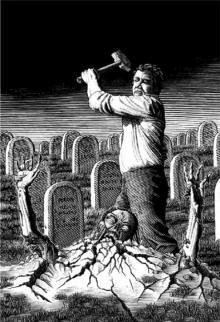 Dawn of the Dreadfuls
Dawn of the Dreadfuls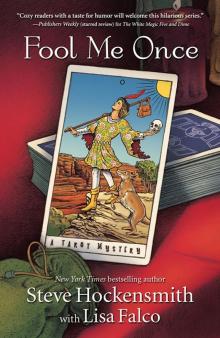 Fool Me Once: A Tarot Mystery
Fool Me Once: A Tarot Mystery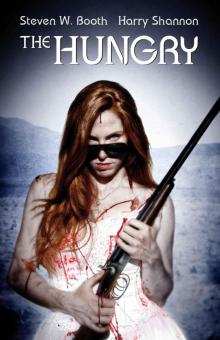 The Hungry
The Hungry Naughty: Nine Tales of Christmas Crime
Naughty: Nine Tales of Christmas Crime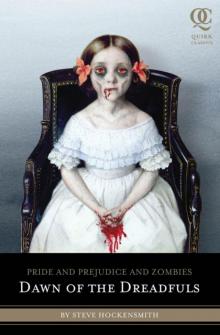 Pride and Prejudice and Zombies: Dawn of the Dreadfuls papaz-1
Pride and Prejudice and Zombies: Dawn of the Dreadfuls papaz-1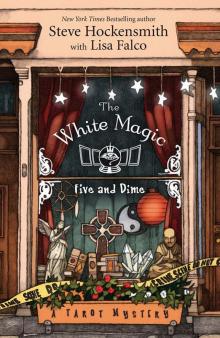 The White Magic Five & Dime (A Tarot Mystery)
The White Magic Five & Dime (A Tarot Mystery)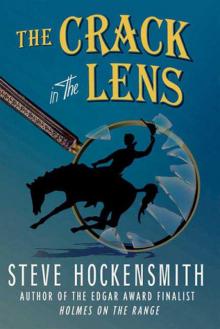 The Crack in the Lens
The Crack in the Lens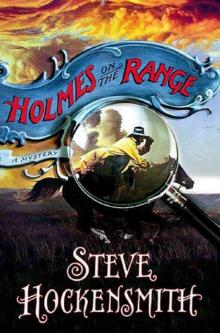 Holmes on the Range
Holmes on the Range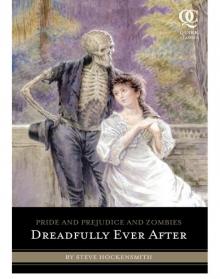 Dreadfully Ever After
Dreadfully Ever After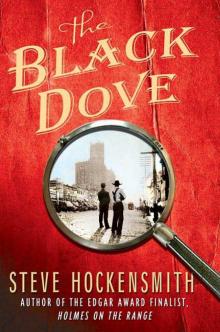 S Hockensmith - H03 - The Black Dove
S Hockensmith - H03 - The Black Dove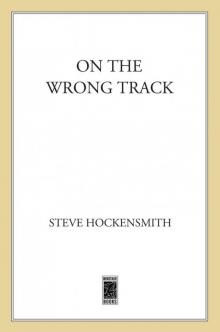 On the Wrong Track
On the Wrong Track Naughty-Nine Tales of Christmas
Naughty-Nine Tales of Christmas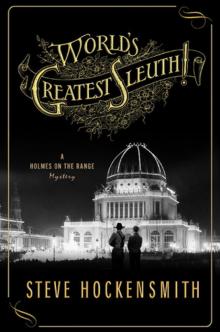 World's Greatest Sleuth!
World's Greatest Sleuth!